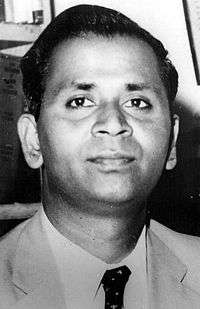Rudranath Capildeo
| Rudranath Capildeo | |
|---|---|
| रुद्रंथ कपिलदेओ | |
 | |
| Leader of the Opposition of Trinidad and Tobago | |
|
In office 1962 – June 1967 | |
| Monarch | Elizabeth II |
| Governor General | Solomon Hochoy |
| Prime Minister | Eric Williams |
| Preceded by | Ashford Shastri Sinanan as Leader of the Opposition of British Trinidad and Tobago (Inaugural holder as Leader of the Opposition of the Republic of Trinidad and Tobago) |
| Succeeded by | Vernon Jamadar |
| Personal details | |
| Born |
2 February 1920 Anand Bhavan (आनंद भवन; The Lion House), Chaguanas, Caroni County, Trinidad and Tobago |
| Died |
12 May 1970 England,[1] United Kingdom |
| Political party | Democratic Labour Party |
| Spouse(s) |
Ruth Goodchild Shirley Anne Gasteen |
| Children |
With Ruth Goodchild: Rudy Capildeo With Shirley Anne Gasteen: Anne Saraswati Gasteen Capildeo |
| Parents | Pundit Ragunath Capildeo and Soogee Capildeo (née Gobin) |
| Alma mater |
Queen's Royal College (Port of Spain, Trinidad and Tobago) University of London (London, England) |
| Occupation | politician and mathematical physicist |
| Religion | Sanātanī Hinduism |
Rudranath Capildeo (Hindustani: रुद्रंथ कपिलदेओ; 2 February 1920 – 12 May 1970) was a Trinidad and Tobago politician and mathematician. He was a member of the prominent Hindu Brahmin, Bihari Indo-Trinidadian and Tobagonian, Capildeo family and Gobin family. He was the Leader of the Democratic Labour Party (DLP) from 1960 to 1969 and Leader of the Opposition in Parliament from 1961 to 1963, succeeding Ashford Sinanan. He was also a faculty member at the University of London, eventually holding the position of Reader of Mathematics. He was also the younger brother of Simbhoonath Capildeo, brother-in-law of Seepersad Naipaul, uncle of Nobel Prize-winning author V.S. Naipaul, Shiva Naipaul, and Surendranath Capildeo, uncle-in-law of Nadira Naipaul, and grand uncle of Vahni Capildeo and Neil Bissoondath. He married Ruth Goodchild in 1944 and they had one son named Rudy. He also has a daughter, Anne Gasteen, born in 1959. He was awarded the Trinity Cross (the nation's highest award) in 1969.
Biography
Capildeo was born at Anand Bhavan (translation: Mansion of Eternal Bliss; aka Lion House) Main Road Chaguanas, Caroni County, Trinidad and Tobago,[1] to Pundit Raghunath Capildeo and his wife Soogee Capildeo (née Gobin),[2] the youngest child of the prominent Capildeo family. He was educated at Queen's Royal College in Port of Spain, Trinidad and Tobago, where he won an island scholarship in 1938. He attended the University of London, in London, England, where he obtained his BSc in Mathematics and Physics in 1943, his MSc in Mathematics in 1945, and his PhD in Mathematical Physics in 1948, his thesis being entitled "The flexure problem in elasticity".
Capildeo held lectureships at the University of London, including at both University College London and at Westfield College. He also taught briefly at Queen's Royal College (1945) and was Principal of the Polytechnic Institute in Port of Spain in 1959.
While Capildeo was a man of undoubted intelligence, his entry into politics in the late 1950s was because the political figures who entered the DLP in 1957 did not trust each other, and could only agree on him. Though he left Trinidad in 1939 to study medicine, Rudranath Capildeo changed his course of study, focusing on applied mathematics and physics. He was committed to understanding the nature of space and time and this sparked his interest in understanding Einstein's Theory of Special Relativity. This work led to several new theories, which had practical implications in aerodynamics and space. They included "The Flexure Problem in Elasticity" (Ph.D. thesis) and his study on the "Theory of Rotation and Gravity" named Capildeo’s Theory, which had applications in early outer-space expeditions in the 1960s and 1970s.[1]
His political career was unusual, since he was active only during election campaigns (in 1961 and 1967) and during the summer months. His conduct of the last pre-independence electoral campaign, in 1961, was also unusual, beginning with his declaration that because he understood Einstein he could "compress the time" necessary to undo what the sitting government had done. Not only did Capildeo produce many significant mathematical theories and a book on Vector Algebra and Mechanics in 1967, he also studied law in London in 1956. Two years later he was admitted to practice as a barrister-at-law in Trinidad. He founded and led the Democratic Labour Party (DLP) in 1960, and became Leader of the Opposition in the Trinidad & Tobago Parliament (1960–67). With Dr. Eric Williams as Prime Minister, both men laid the foundation for an independent Trinidad and Tobago.[1] Capildeo was also responsible for having the freedom of worship included in the Constitution of Trinidad and Tobago and Service Commissions (because he felt that service commissions would ensure equality and fairness in the appointment of people to public office).
See also
References
- 1 2 3 4 "Rudranath Capildeo - Mathematician", Caribbean Icons in Science, Technology and Innovation. Niherst Profile.
- ↑ "Dr. Rudranath Capildeo (1920-1970)", NALIS.